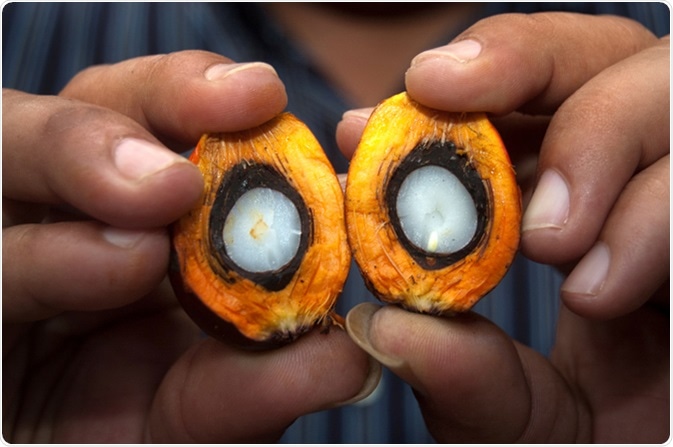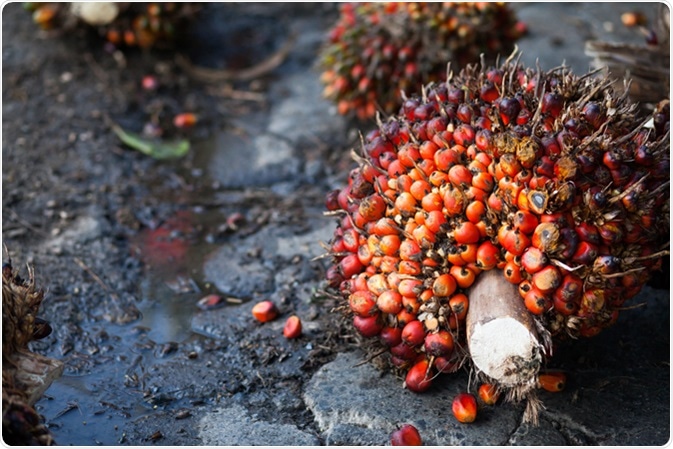People all over the world habitually use oils and fats for their daily cooking, in order to add quick energy and taste, but also to complement their food with certain health benefits. Different oilseeds and nuts, as well as animal fats, have served as the source for these fats. Among these, palm oil has been historically one of the most commonly used fats in the world.
African populations have traditionally relied upon red palm oil and coconut oil, as well as groundnut and sesame oil. Palm oil is from the fruit of the oil palm, Elaeis quineensis.

Palm fruits. Image Credit: Mosista / Shutterstock
Palm oil and coconut oil have gained bad press in the past few decades because of their extremely high saturated fat content. The allegations of the link between saturated fats, blood cholesterol, obesity and cardiovascular disease abounded in the Western developed nations, backed by current scientific research and government agencies.
As a result, many developing countries - which had been using palm oil for decades - started to shift to other imported vegetable oils. This hurt not only the local and national economy, and put many out of employment, but failed to curb the epidemic of heart disease. In fact, in many cases it was the following surge in Westernized dietary habits that fueled the epidemic.
Palm oil composition and its effects on blood lipids
Palm oil contains 50% saturated fatty acids (SFAs), 40% monounsaturated fatty acids (MUFAs) and 10% polyunsaturated fatty acids (PUFAs). The chief SFA is palmitic acid, but lauric and myristic acid are present in minute amounts.
Research has shown that palm oil in a low-fat diet keeps the total cholesterol within normal limits, because of the presence of palmitic acid at the alpha-position of the fatty acid. Many studies report that palm oil (when added to the diet in rodents) prevents lipid peroxidation and inflammatory damage to tissues even when ischemic injury occurs followed by reperfusion.
In human studies its total cholesterol lowering effects were comparable to those of polyunsaturated oils. This is because the stearic, oleic and linoleic acids counteract the cholesterol-raising effects of palmitic, lauric and myristic acid. In fact, palm oil is capable of being safely substituted for olive oil with the same heart health benefits.
Palm oil is also solid at cooler temperatures, which confers a benefit in the form of not needing to be hydrogenated to make it solid. This avoids the formation of trans fats during the hydrogenation process. Palm oil has a smoke point of 235% and thus it can be deemed suitable for even deep frying, as it fails to volatilize quickly. This prevents the formation of many toxic products such as acrolein.
The benefit of containing vitamins and phytosterols
Palm oil contains various carotenes which help to maintain normal vitamin A levels, in turn keeping the photoreceptors in the retina functional. This is crucial in preventing night blindness in developing countries in Africa. In addition, it has a high vitamin E content which are powerful antioxidants, keeping the oil from becoming rancid quickly in the high temperatures of Africa.
These constituents of palm oil also prevent cell membrane oxidation, plasma LDL oxidation, as well as the oxidation of various carrier lipoproteins and coagulation promoters, thus being protective against chronic oxidative damage. This is important in preventing metabolic and neoplastic processes which are a consequence of inappropriate oxidation.
It also contains sitosterol, campesterol and other phytosterols which are rapidly digested and used to synthesize cholesterol in the steroid biosynthetic pathway. Furthermore, it contains the molecule squalene which inhibits the enzyme HMG-CoA responsible for regulating the rate-limiting step in cholesterol synthesis. It is, therefore, unlikely that moderate use of palm oil as a source of dietary fat will push up blood cholesterol levels.
 Palm Oil Fruits on the palm tree. Image Credit: MIA Studio / Shutterstock
Palm Oil Fruits on the palm tree. Image Credit: MIA Studio / Shutterstock
Economic development
It is noteworthy that palm oil is grown in many developing countries and provides vital security to their economies. This is the only measure capable of alleviating poverty in such regions. Hence it is necessary to promote and properly regulate the farming and harvesting of oil palms in areas where it is cultivated in order to help the people there reap the benefits of commercially viable and healthy indigenous oil for cooking use.
Indonesia and Malaysia are currently the top producers of palm oil, but indignation is rife over the alleged destruction of rain forests in these countries in order to gain more area to plant palm trees. While ecological sensibility is required and desirable, it is also necessary to keep human interests in mind and evolve a gradated and locally mediated, as well as locally sustainable alternative to rain forest removal while keeping the production of palm oil viable and growing in these poverty-stricken areas.
In conclusion, it is unnecessary to advocate replacing the use of palm oil with other vegetable or oilseed-derived oils rich in PUFA and MUFA because such a substitution does not bring about any beneficial change in the ratio of ‘good’ HDL to ‘bad’ LDL cholesterol. It is as effective as oleic acid, widely recognized to be a heart-healthy fatty acid, in maintaining lipoprotein levels and improving cardiovascular health.
References
Further Reading
Last Updated: Feb 26, 2021